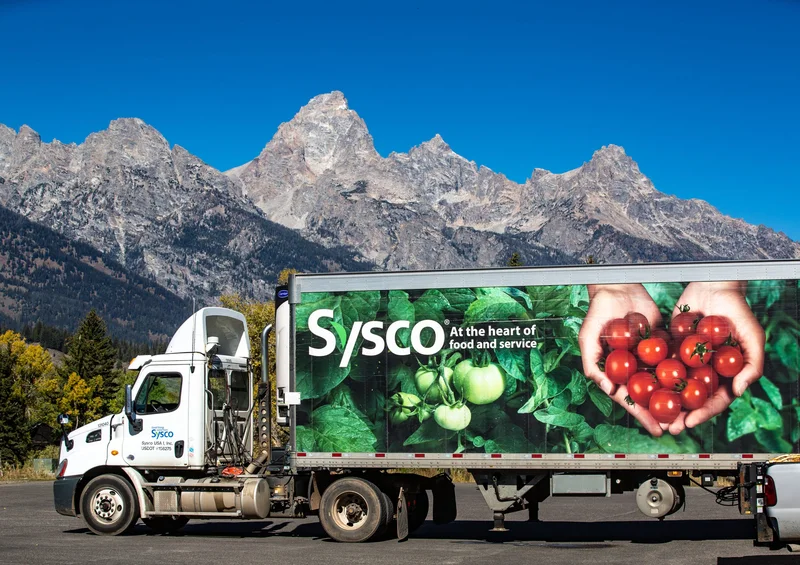Let’s be honest for a moment. Most of us don’t think about how the food gets to our favorite restaurant, or how the hospital cafeteria gets its supplies. We just expect it to be there. This seamless, invisible flow is the product of one of the most complex systems humanity has ever built: the modern supply chain. And at the heart of that system are giants like Sysco, an $81 billion corporation that functions less like a company and more like a planetary-scale algorithm designed for maximum efficiency. It’s a marvel of logistics, data, and optimization.
But last week, in a union hall in Portland, Oregon, a critical piece of that machine—the human part—sent a signal that can’t be measured on a stock ticker. By a staggering 99.5 percent margin, 270 drivers, mechanics, and warehouse workers voted to authorize a strike. They are the ones who actually lift the boxes, drive the trucks, and turn the wrenches. And they’ve decided they are worth more than the algorithm is currently paying them.
This isn’t just another labor dispute. I see this as something far more profound. This is a stress test of our entire automated, just-in-time world. When I first saw the headline, Teamsters at Sysco Portland Authorize Strike, I honestly just sat back in my chair, speechless. A 99.5 percent margin isn't a negotiation tactic; it's a unified human voice screaming that the system is broken. What happens when the living, breathing "wetware" that executes the corporate code decides the code itself is fundamentally flawed?
To understand what’s at stake, you have to appreciate the sheer scale of Sysco. We’re talking about 337 distribution centers, 75,000 employees, and nearly three-quarters of a million customer locations. It’s the economy’s circulatory system—or, to put it more simply, the invisible plumbing that keeps our society fed and functioning. The company’s investor relations page is a symphony of success: $1.95 billion in net profits last year, glowing "Buy" ratings from Wall Street analysts, and executives selling off millions in stock. From a 30,000-foot view, the machine is humming along perfectly.
But down on the ground, the gears are grinding. The Teamsters in Portland are demanding a contract that reflects the gains their counterparts have won elsewhere, pointing to a pattern of the company resisting fair compensation until its hand is forced. This is the fundamental conflict of our age, isn't it? We have these incredibly sophisticated corporate systems designed to optimize every possible variable for profit, yet they repeatedly fail to solve for the most important variable of all: human dignity.

It’s like writing a brilliant piece of software with a critical bug. Sysco can offer "customized supply chain solutions" and sponsor a NASCAR team, plastering its logo on a car that represents the pinnacle of speed and efficiency. But what good is that glossy PR if the people who load the trucks feel undervalued and are ready to bring the whole operation to a screeching halt? Can a company truly be called a leader in logistics if it can't manage the logistics of a fair relationship with its own workforce?
This isn’t a new story for Sysco. It’s a recurring glitch in their operating system. Back in 2023, the company forced strikes in Indianapolis and Louisville by refusing to bargain in good faith, a standoff that ended only after the picket lines spread and the pressure became unbearable. That fight resulted in record-breaking contracts for the workers. It’s a playbook, and both sides know their roles. The company pushes, the workers push back, and the system shudders.
The speed and interconnectedness of this is just staggering—it means a localized dispute in Portland can instantly become a national pressure point, because the Teamsters have learned that their strength lies in their ability to extend a picket line from one warehouse to another, creating a cascading failure in a distributed network that was designed for constant flow. It’s the ultimate demonstration that this isn't just about 270 people in Oregon; it’s about the 10,000 Sysco workers nationwide who are part of the same human network.
So, as we watch this situation unfold, with the contract set to expire on October 11, we have to ask ourselves what this means for the future. We are building a world that relies more and more on complex, interconnected, and automated systems. But who holds the power in that world? Is it the executives and shareholders who design the algorithm, or the people on the ground whose hands, minds, and dedication are still, for now, irreplaceable? This showdown in Portland is more than a headline; it’s a preview of the defining struggle of the 21st century.
When you strip away the press releases and the financial reports, the situation at Sysco Portland is a beautifully simple, human story. It's a reminder that the most advanced supply chain in the world is utterly dependent on a person deciding to get in a truck and drive. We can optimize routes, predict demand, and manage inventory with breathtaking precision, but we haven't yet found a replacement for a motivated, respected, and fairly compensated human being. This isn't a bug in the system; it's the system's most essential feature. And any company that forgets that, no matter how big or profitable, is building its future on a foundation of sand.